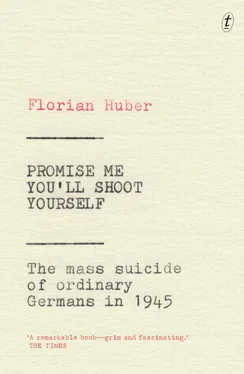‘This is the last of the three graves I have dug for my children! I shall be going soon too. We’ve had a dreadful night. There are many more women and children in the house, lying in their own blood!’
They went in and found the doctor and his wife about to leave. The couple seemed close to madness. They had a packet of poison with them; they too had made up their minds to put an end to it all. Marie Dabs began to realise something of what had gone on in town that night while she’d been shivering in Deven Wood. It stirred a deep dread in her, but at the same time she felt a strange pull. Suddenly she, too, found herself able to imagine the previously unimaginable. ‘I asked them to give us some poison as well, but there was only enough for the two of them, and they went on their way.’ The corpses of Dr Melzer and his wife lay on the edge of Deven Wood for days.
Marie Dabs and her small party kept going, leaving the outskirts of Demmin for the open countryside, until they arrived at the nearby village of Eichholz, where her father owned a plot of meadowland and a poultry farm on the Trebel. She had previously arranged to meet him here in the event of a Russian invasion, and found when she arrived that he had already taken in several other refugees. He put his daughter and her party up in a hut made of bundles of thatch, together with the Wockersins and their twelve-year-old son. Like the Dabs, Herr Wockersin ran a fur business in Demmin. He had always been a man of few words and rather aloof, seeing them as competitors; now, in extreme plight, he remained reserved and silent. After one night with Marie Dabs and the others, the Wockersins strapped three bulging rucksacks on their backs without a word of explanation and went off in silence. ‘When my father brought us a small pail of milk early the next morning, he told us that the Wockersins had walked into the Trebel.’
In the space of only a few hours, Marie Dabs had encountered several people about to commit one of the most extreme acts a human can. Even she, inveterate optimist that she was, came close to succumbing. The dark mood that was dragging so many into the abyss had taken hold of her, too.
• • •
In the days between 30 April and 3 May 1945, Demmin became the scene of an unprecedented wave of suicides. People went to their deaths in droves: young men and women, staid married couples, people in the prime of life, the retired and the elderly. Many took their children with them: infants and toddlers, schoolchildren and adolescents. The victims could not be easily categorised. Hundreds were refugees from Pomerania, East and West Prussia and elsewhere, but there were also hundreds from Demmin and the surrounding area. Blue- and white-collar workers died, clerks and tradesmen, doctors and pharmacists, housewives and war widows, shopkeepers and policemen, managers and accountants, pensioners and teachers. Among the dead were a butcher, a carpenter, a cartwright, a charwoman, a tax clerk, a mechanic, a manager, a chef, a hotelier, a joiner, a chemist, a postman, a post office assistant, a retired postal inspector, a well-digger, a turner, a dentist, a seamstress, a tax inspector, a cattle dealer, a midwife, a retired customs clerk, a notary, a forester, a roadmender, a prison warden, a farmer, a smith, a former headmaster, a paver, a barber and a mayor. Dozens of unidentified bodies were also buried in the mass graves dug in Demmin’s cemetery in early May—people whose names and backgrounds remain unknown. Those who went to their deaths were of all ages, classes and professions. The suicides of Demmin represented a cross-section of small-town German society. It was as if the death urge had suddenly gripped them all.
• • •
Some people decided to go this way alone. Elise Ramm, an elderly widow, hanged herself in her flat. Former chief post office clerk Albert Wollbrecht drowned in the River Tollense, aged almost eighty. Charlotte Höffler, an accountant, died in a summerhouse on 1 May.
Many married couples and families, though, committed joint suicide. Elderly couples killed themselves together, like sixty-four-year-old cartwright Franz Höffler and his wife, Gertrud, who hanged themselves in their flat in Mühlenstrasse, or master barber Ernst Hoffmann and his wife, Hertha, both seventy-four, who drowned themselves in a canal by the gasworks. Some killed themselves along with their parents or grown-up children: mechanic Ernst Hirrick died with his wife, Käte, and their twenty-year-old daughter, Gerda, in a canal by the sewage works; chemist’s wife Käte Müller was found dead in her flat in Anklamer Strasse together with her seventeen-year-old daughter and seventy-year-old mother. Even large families were wiped out at a single blow. In Bahnhofstrasse, on 1 May, forty-eight-year-old teacher Paul Heinrich Behnke killed his entire family—his fifteen-year-old daughter, Irmgard Johanna, his two-year-old son, Hans, his wife, Irmgard Gertrud, and himself. That same day, another entire family gave up the struggle only a few streets away: young cook Hermann Halmich and his wife, their year-old child and its grandmother.
A particularly unusual case of collective suicide took place in the house of sixty-six-year-old furniture manufacturer Oskar Günther. On the morning of 30 April, about twenty people were gathered in his house in Baustrasse—his sister, his daughter, his daughter-in-law and a host of other friends and relations, including a forester called Gustav Sembach. The Soviet soldiers came, the looting and rape began, and the sea of flames crept steadily closer. After two days, Oskar Günther, his wife, Elsa, and her sister Hedwig poisoned themselves. Neighbours reported that the Günthers’ daughter had hastened their deaths by slitting their wrists with razor blades. Their bodies were burnt along with the house, but not before their friends and family had fled from Baustrasse, some of them making for a couple of summerhouses north of the old town. Here, another bloodbath ensued. Sembach the forester took his rifle and shot Günther’s daughter-in-law Gertrud and her four-year-old daughter. He then shot his wife, Paula, and elderly merchant’s wife Charlotte Richter and her daughter. When he was the only one left, Gustav Sembach put a bullet in his own head, but it did not immediately prove fatal. He was to live almost two months more before succumbing to his injuries.
• • •
Considerable numbers of women and children died in Demmin. At the time of the Soviet conquest, most young and middle-aged men were at the front, in POW camps or buried in soldiers’ graves. The women had been left behind in Demmin with their children or stranded there while fleeing westwards. For days, they were at the mercy of the conquering soldiers’ frenzied violence. Almost all reports describe the rape and abuse that were a constant and ever-present threat to women of all ages: soldiers who broke into flats and cellars in the middle of the night and shone torches into women’s faces; soldiers who raped a young girl several times on an asparagus patch; soldiers who assaulted a sixty-four-year-old woman on the street, in front of her daughter and grandson.
A young medical student, Lotte-Lore Martens, who was evacuated from Demmin’s eastern outskirts by Soviet soldiers on 1 May, describes in her memoirs the moment when horror gave way to a feeling of doom. After asking relatives in Campstrasse to look after her father, who’d been an invalid since the First World War, she set off with her mother in search of new lodgings for the family. But the way into town was blocked. ‘My mother and I had just reached the corner of Augustastrasse when we saw a huge crowd rushing towards us like an avalanche.’ They had come up against the mass of people fleeing eastwards—away from the prowling Soviet soldiers and the flames of the old town. Swept along by the crowd, they headed the same way, up the hill past the cemetery to a rise outside town, above the Tollense valley. From this vantage point, Lotte-Lore Martens saw clouds of smoke rising from the old town, and was reminded of Rome burning under Nero. But it was another sight that left her reeling: a never-ending line of women, running not so much from the fire as from their own fate. A desperate procession in broad daylight.
Читать дальше












